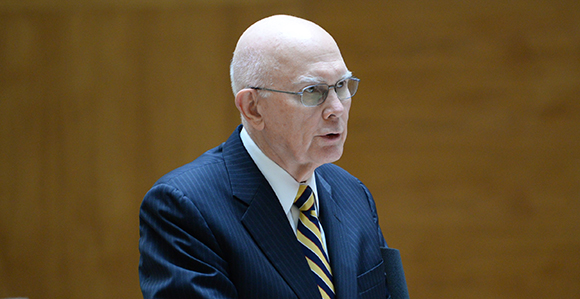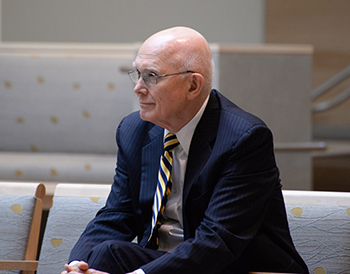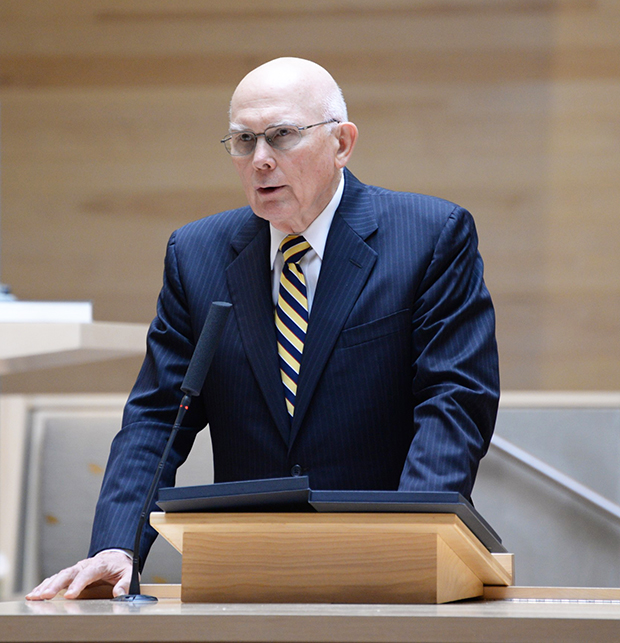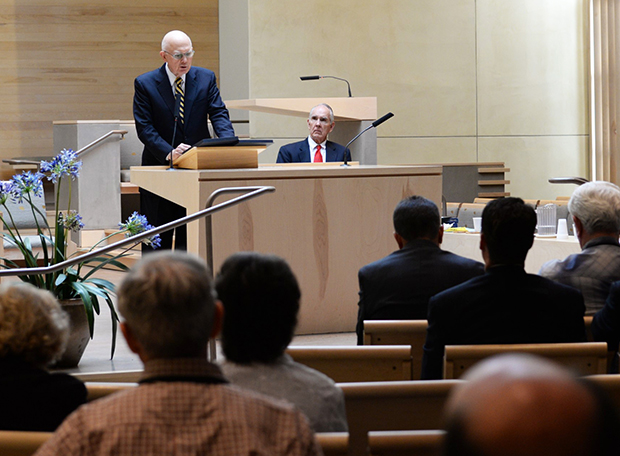Government and Religion Should Collaborate, Not Conflict, Apostle Says
Contributed By R. Scott Lloyd, Church News staff writer

Elder Dallin H. Oaks of the Quorum of the Twelve Apostles addresses the second annual Sacramento Court/Clergy Conference at Congregation B’nai Israel in Sacramento, California.
Article Highlights
- Parties with different views on the relationship between church and state should advocate and act with civility.
- On the big issues, both sides should seek a balance, not a total victory.
- Don’t be led or unduly influenced by the extreme voices that are heard from contending positions.
“We must learn and practice mutual respect for others whose beliefs, values, and behaviors differ from our own.” —Elder Dallin H. Oaks of the Quorum of the Twelve Apostles
SACRAMENTO, CALIFORNIA
In achieving a common goal to live together in happiness, harmony, and peace, “we must learn and practice mutual respect for others whose beliefs, values, and behaviors differ from our own,” Elder Dallin H. Oaks told an audience of religious leaders, judges, and lawyers October 20.
Elder Oaks of the Quorum of the Twelve Apostles was invited to address the Second Annual Sacramento Court/Clergy Conference in this California capital city.
“My purpose is to advance this conference’s objective to be ‘a forum for mutual support, understanding, edification, and collaboration between the judiciary and regional communities of faith,’” he said. “I will, therefore, refrain from advocating my strongly held views affecting religious freedom. Instead, I will focus my remarks on two of your objectives: ‘mutual … understanding’ and ‘edification.’”
Elder Oaks declared that religion and government should be mutually supportive. “We may have cultural differences, but we should not have ‘culture wars,’” he said.

Elder Dallin H. Oaks waits to speak on Tuesday, Oct. 20, 2015, at the second annual Sacramento Court/Clergy Conference at Congregation B’nai Israel in Sacramento, California.

Elder Dallin H. Oaks addresses the second annual Sacramento Court/Clergy Conference at Congregation B’nai Israel in Sacramento, California.
“In that relationship, governments and their laws can provide the essential protections for believers and religious organizations and their activities,” he said. “Believers and religious organizations should recognize this and refrain from labeling governments and laws and officials as if they were inevitable enemies. On the other hand, those skeptical of or hostile to believers and their organizations should recognize the reality—borne out by experience—that religious principles and teachings and their organizations are here to stay and can help create the conditions in which public laws and their institutions and their citizens can flourish.”
Citing 19th-century writer Alexis de Tocqueville, Elder Oaks said that voluntary associations like churches—today often called “mediating institutions”—lead citizens to choose to obey laws that governments cannot enforce.
Acknowledging that there will be differences that must be resolved by the rule of law, Elder Oaks said such differences “must not obscure the basic fact that we are in this together, we need each other, and we can resolve our differences through mutual respect, mutual understanding, and the collaboration you advocate.”
Elder Oaks said that as a former law clerk to Chief Justice Earl Warren of the U.S. Supreme Court, later a prosecutor in the state courts of Illinois, still later a Utah Supreme Court Justice, and today as a General Authority in the Church, he has viewed the boundary between church and state from both sides.
Recalling the well-known metaphor of “a wall between church and state,” Elder Oaks rejected the concept and substituted instead the imagery of “a curtain that defines boundaries but is not a barrier to the passage of light and love and mutual support from one side to another.”
He suggested a few general principles. “First, parties with different views on the relationship between church and state should advocate and act with civility,” he said.
“Second, on the big issues … both sides should seek a balance, not a total victory.”
He cited as an example a compromise recently crafted by the Utah State Legislature in a conflict over individual free exercise of religion and enforced nondiscrimination in housing and employment. “It gave neither position all that it sought but granted both positions benefits that probably could not have been obtained without the kind of balancing that is possible in the law-making branch but not in the judiciary.”
His third suggested principle was that “it will help if we are not led or unduly influenced by the extreme voices that are heard from contending positions.”
Elder Oaks also gave “some suggestions for each contender in current struggles over the proper boundary between the different realms of church and state.”

Elder Dallin H. Oaks addresses the second annual Sacramento Court/Clergy Conference at Congregation B’nai Israel in Sacramento, California.
Speaking first to his fellow believers advocating the maximum free exercise of religion, he reminded them that there are two different systems of law: divine and civil. “In all events, we must be very measured before ever deciding—in the rarest of circumstances—to disregard one in favor of the other,” he admonished.
“The right of some to act upon their religious principles must be circumscribed by the government’s responsibility to protect the health and safety of all,” he said.
Believers should acknowledge the validity of constitutional laws and recognize that officials in the executive or judicial branches of government who enforce or interpret laws take an oath that does not leave them free to override the law in furtherance of their personal beliefs, religious or otherwise.
“A county clerk’s recent invoking of religious reasons to justify refusal by her office and staff to issue marriage licenses to same-gender couples violates this principle,” he said. He added that far more significant violations of the rule of law occur when governors or attorneys general refuse to enforce or defend a law they oppose on personal grounds.
This implies no compulsion on an office holder’s conscience, Elder Oaks added. “Surely a constitution that grants unique guarantees to the ‘free exercise’ of religion cannot deny religious judges the application of their religious experiences while inevitably granting other judges the application of their secular experiences.”
Elder Oaks also offered “some suggestions for those who have other keys to or nonreligious values for their human dignity.
“First, please respect the laws that provide unique protections for believers and religious institutions, and please accept the fact that this grants religion an honorable place in our public life.”
He noted that the First Amendment in the Bill of Rights of the U.S. Constitution singles out the “free exercise” of religion for special protection, along with free speech, free press, and freedom of assembly.
“Surely this unique constitutional guarantee of the ‘free exercise’ of religion was intended to grant unique protections to those acting in accordance with religious belief,” Elder Oaks said. He cited scholar Michael McConnell’s observation that when the First Amendment was drafted, the writers chose the phrase “free exercise of religion” over “rights of conscience,” a choice of “utmost importance” because it makes clear “the First Amendment protected more than just belief. It protected action in accordance with belief.”
The preference in the phrasing also showed “that religiously based scruples are given more solicitude than nonreligiously based ones,” Elder Oaks noted.
“Second, we must take notice of current theories asserting that religious speech is more dangerous and therefore less deserving of protection than other types of speech,” he warned. “Without detailing the obvious, I merely maintain that the constitutional freedom of religion is intended to be guaranteed—and is guaranteed—not only by the First Amendment’s free exercise clause, but is also protected by the companion guarantees of freedom of speech and freedom of assembly.”
He acknowledged that there are extremist and terrorist groups that attempt to use religious beliefs to justify violent acts. “Those excesses can and should be rejected by our understanding of the limits on any constitutional right,” he said. “Similarly, we all understand the common-sense principle that the prospect of abuse of a constitutional right must not be used to veto that right. We resist that tendency for speech and press, and we must also resist it for religion.”
He warned against “strong movements in our country to crowd religious voices, values, and motivations from the pubic square. One way this is done is to shout down such arguments as irrational or reflective of hatred or bigotry, thus forestalling consideration of the very real secular as well as religious reasons supporting their positions.”
Religious leaders and religiously motivated persons should have at least the same privileges of speech and participation as other persons or leaders in the public square, Elder Oaks affirmed.
“I conclude by urging upon those attending this conference the importance of remembering the vital constitutional rights of free exercise of religion and free speech and assembly when considering controversies involving religion and religious expression,” he said. “That perspective is vital to advancing our desired collaboration between the judiciary and religious institutions.”
